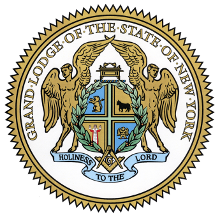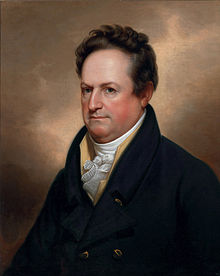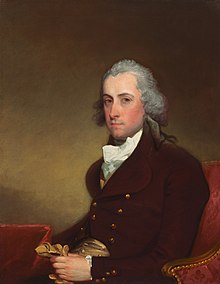Grand Lodge of New York
 | |
| Formation | December 15, 1782 |
|---|---|
| Location | |
Region | New York |
Grand Master | Steven Adam Rubin |
| Website | www |
| Part of a series on |
| Freemasonry |
|---|
 |
The Grand Lodge of New York, officially the Grand Lodge of Free and Accepted Masons of the State of New York, is the largest and oldest of several organizations of Freemasons that are based in the U.S. state of New York.[1] The offices of the Grand Lodge are located at Masonic Hall in New York City.
The Grand Lodge of New York was founded December 15, 1782 and it acts as the coordinating body for many Masonic functions undertaken throughout the state. Its various committees organize the Masonic Home in Utica, the Livingston Masonic Library[2] and various charitable events around New York State. The Grand Lodge of New York has jurisdiction over approximately 24,000 Freemasons, organized in more than 800 Lodges in New York State[3] and an additional 9 lodges in Lebanon. The GLNY first began chartering lodges in Lebanon in 1924.[4]
History
[edit]Colonial and federalist eras: 1730–1820
[edit]The first documented presence of Freemasonry in New York dates from the mid-1730s, when Daniel Coxe Jr. (1673–1739), was appointed by Charles Howard, 10th Duke of Norfolk, the Grand Master of the Premier Grand Lodge of England, known to historians as the "Moderns", to act as a Provincial Grand Master for the provinces of New York, New Jersey, and Pennsylvania. No authenticated primary source records exist of his tenure as Provincial Grand Master, and he died a few years after his appointment. Thus, it seems doubtful that he exercised any real authority in Masonic endeavors.
From 1738 to the 1780s, additional Warrants were issued by the GLE, the Moderns, to Francis Goelet (1738–1753), George Harrison (1753–1771) and Sir John Johnson (1771–1783) to serve as Provincial Grandmaster. As Johnson was a supporter of the British during the American Revolution, he is believed to have taken his warrant with him when he fled to Canada, thus leaving the Moderns Lodges without a Provincial Grand Master.[5]
To further complicate matters, by the 1750s, the Antient Grand Lodge of England, known to historians as the "Ancients", a rival Masonic Grand Lodge, had also created a Provincial Grand Lodge of New York, which subsequently chartered lodges under its own jurisdiction. Additional lodges were chartered in New York by the Grand Lodge of Scotland and the Grand Lodge of Ireland.
The Ancients retained their charter throughout the Revolution, and it was based upon this charter that an independent Grand Lodge of New York was created in 1781, with Robert R. Livingston as Grand Master. The Grand Lodge of New York was officially organized on December 15, 1782, under the Provincial Grand Warrant dated September 5, 1781, from the “Athol” or Antient Grand Lodge of England. The warrant was issued by John Murray, 4th Duke of Atholl who was serving as Grand Master of the Antient Grand Lodge of England at the time.
The Grand Lodge declared its independence and assumed its modern title “Grand Lodge of Free and Accepted Masons of the State of New York” on June 6, 1787. While the "Athol" Charter descended from the "Ancients", Livingston himself was a member of a "Modern" Lodge. Thus the two rival Grand Lodge traditions, which in England did not unite until 1813, had already merged before that in New York State.
Grand Lodge Buildings: 1826-1856 and 1875-Present
[edit]
Early Masonic meetings and meetings of the Grand Lodge were likely held at taverns as well as an early iteration of Tammany Hall. On June 24, 1826 the cornerstone was laid for a Gothic style Masonic Hall on Broadway in lower Manhattan between Reade and Pearl Streets, directly across from the original site of the New York Hospital.[6] This would serve as the home of the Grand Lodge until it the building was demolished in 1856.[7] Perhaps the most important Masonic in this period was the merger of the Grand Lodge of New York with the St. John Grand Lodge, which took place at Tripler Hall on December 27, 1850.[8]
Due to infighting in the Grand Lodge, the Panic of 1857, and the Civil War, it would not be until the 1870s, that the Grand Lodge would again have a permanent meeting location. In 1870, the cornerstone was laid for a new Second French Empire Style building which served as the headquarters of the Grand Lodge from 1875 to 1909.
The current Grand Lodge building is located at 23rd Street and 6th Avenue and was built in 1909, on the same site as the 1875 Grand Lodge Building. At the time, the building caused some controversy, and Past Grand Master James Ten Eyck resigned as Trustee of the Masonic Hall and Asylum Fund in an effort to convince the then sitting Grand Master Townsend Scudder that the construction of the building would be unwise.[9]
Noteworthy Lodges
[edit]St. John's Lodge No. 1, chartered on December 5, 1757,[10] is the oldest operating Lodge under the jurisdiction of the Grand Lodge of New York.[11] St. John's Lodge is the custodian of what is now known as the George Washington Inaugural Bible. On April 30, 1789, it was upon this Bible that George Washington took his oath of office as the first president of the United States.[12] In 2009, the Lodge formed a registered public charity for the purpose of preserving, maintaining and restoring the George Washington Inaugural Bible. In 2014, the St. John's Lodge No. 1 Foundation, Inc. received recognition as an IRS 501(c)3.[13]
Holland Lodge No. 8 was founded in 1787 and originally conducted ritual in the Dutch language. It is the largest lodge by membership currently in the Grand Lodge of New York, and was the lodge in which Franklin Delano Roosevelt took his Masonic degrees.[14]
Warren Lodge No. 32 has the distinction of being the New York's only remaining Full Moon Lodge, whereby its monthly meeting date is the "Thursday before every full moon", rather than on a set calendar day.[15]
Charity
[edit]The Grand Lodge of New York has a long history of supporting charitable causes. Among the organizations that are rooted in its charitable endeavors are, the Masonic Medical Research Institute, Acacia Village and Masonic Home in Utica; the Chancellor Robert R. Livingston Library and Museum in New York and Utica; the Masonic Youth Camp at Camp Turk in Woodgate; the DeWint House at Tappan and its many charitable activities of its annual Brotherhood Fund Drive. The Grand Lodge sponsors drug and alcohol awareness programs in schools, and gives thousands of dollars a day to worthy charities around the State.
Relationships with other Masonic organizations
[edit]The Masonic youth group Organization of Triangles, Inc., was founded in New York in 1925.[16]
Since 2001, the Grand Lodge of New York has had mutual recognition with the Prince Hall Grand Lodge of New York.[17]
Grand Masters
[edit]



The current Grand Master is Steven Adam Rubin. The past Grand Masters are as follows:[18]
- 1781–1783 William Walter
- 1783–1784 William Cock
- 1784–1800 Robert R. Livingston
- 1801–1805 Jacob Morton
- 1806–1819 DeWitt Clinton
- 1820–1821 Daniel D. Tompkins
- 1822–1824 Joseph Enos
- 1825–1829 Stephen Van Rensselaer
- 1830–1843 Morgan Lewis
- 1844–1845 Alexander H. Robertson
- 1846–1849 John D. Willard
- 1850 William H. Milnor
- 1850 Henry S. Atwood
- 1851 Oscar Coles
- 1852 Nelson Randall
- 1853 Reuben H. Walworth
- 1854–1855 Joseph D. Evans
- 1856–1859 John L. Lewis Jr.
- 1860 John W. Simons
- 1861 Finlay M. King
- 1862 John J. Crane
- 1863–1864 Clinton F. Paige[19]
- 1865–1866 Robert D. Holmes
- 1867 Stephen H. Johnson
- 1868–1870 James Gibson[20]
- 1870–1871 John H. Anthon[21][22]
- 1872–1874 Christopher G. Fox[23]
- 1874–1875 Ellwood E. Thorne[24]
- 1876 James W. Husted
- 1877 Joseph J. Couch
- 1878 Edmund L. Judson
- 1879 Charles Roome[25]
- 1880 Jesse B. Anthony
- 1881 Horace S. Taylor
- 1882 Benjamin Flagler
- 1883 J. Edward Simmons
- 1884 William A. Brodie
- 1885–1888 Frank R. Lawrence[26]
- 1889–1890 John W. Voorman
- 1891–1892 William Sherer[27]
- 1892 James Ten Eyck
- 1893 Frederick A. Burnham
- 1894 John Hodge
- 1895–1896 John Stewart
- 1897–1898 William A. Sutherland
- 1899 Wright D. Pownall
- 1900–1901 Charles W. Mead
- 1902–1903 Elbert Crandall
- 1904–1905 Frank H. Robinson
- 1906–1907 Townsend Scudder
- 1908–1909 S. Nelson Sawyer
- 1910–1911 R. Jodson Kenworthy
- 1912–1913 Charles Smith
- 1914–1915 George Freifeld
- 1916–1917 Thomas Penney
- 1918–1919 William S. Farmer
- 1920–1921 Robert H. Robinson
- 1922–1923 Arthur S. Tompkins[28]
- 1924–1925 William A. Rowan
- 1926–1927 Harold J. Richardson
- 1928–1929 John A. Dutton
- 1930–1931 Charles H. Johnson
- 1932–1933 Chris C. Mollenhauer
- 1934–1935 Robert Elliott Owens
- 1936–1937 Jacob Charles Klinck
- 1938–1939 Dana B. Hellings
- 1940–1941 Henry C. Turner
- 1942–1943 William Frederick Strang
- 1944–1945 Charles W. Froessel
- 1946–1947 Gay H. Brown
- 1948–1949 Frank M. Totton
- 1950–1951 Richard A. Rowlands
- 1952–1953 Ward B. Arbury
- 1954–1955 Raymond C. Ellis
- 1956–1958 Nathan Turk
- 1958–1960 H. Lloyd Jones
- 1960–1962 Carl W. Peterson
- 1962–1964 Harry Ostrov
- 1964–1966 Clarence J. Henry
- 1966–1968 Frank C. Staples
- 1968–1970 Charles F. Gosnell
- 1970–1972 William R. Knapp
- 1972–1974 Lloyd S. Cochran
- 1974–1976 Arthur Markewich
- 1976–1978 Albert W. Schneider
- 1978–1980 William R. Punt
- 1980–1982 Bruce Widger
- 1982–1984 Ernest Leonardi
- 1984–1986 Calvin G. Bond
- 1986–1988 Robert C. Singer
- 1988–1990 Roswell T. Swits
- 1990–1992 Richard P. Thomas
- 1992–1993 Sheldon K. Blank
- 1993–1995 Gary A. Henningsen
- 1995–1998 Earle J. Hino Jr.
- 1998–2000 Stewart C. McCloud
- 2000–2002 Carl J. Smith
- 2002–2004 Carl J. Fitje
- 2004–2006 Edward R. Trosin
- 2006–2008 Neal I. Bidnick[29]
- 2008–2010 Edward G. Gilbert
- 2010–2012 Vincent Libone
- 2012–2014 James E. Sullivan
- 2014–2016 William J. Thomas
- 2016–2018 Jeffery M. Williamson
- 2018–2021 William M. Sardone
- 2021–2024 Richard J. Kessler
- 2024–Present Steven Adam Rubin
Notes
[edit]- ^ "Bessel: All US Masonic organizations".
- ^ "Chancellor Robert R Livingston Masonic Library – Collecting, Studying, and Preserving Masonic Heritage". Retrieved 2023-08-08.
- ^ 2022 Empire Mason Magazine
- ^ "District Grand Lodge of Syria-Lebanon". Grand Lodge of Free & Accepted Masons of the State of New York. Retrieved 2023-08-08.
- ^ Bicentennial Commemorative Volume of Holland Lodge No. 8, published by the Lodge, New York, 1988. pp 9-12
- ^ "Visualizing 19th-Century New York". visualizingnyc.org. Retrieved 2022-12-24.
- ^ "Grand Lodge of New York's Gothic Hall – Chancellor Robert R Livingston Masonic Library". 3 March 2022. Retrieved 2022-12-24.
- ^ "The great Masonic celebration of the brethren hitherto under the jurisdiction of St. John's Grand Lodge with the most worshipful grand lodge of the M.A. & hon. fraternity of free & accepted masons of the State of New York, at Tripler Hall, City of New-York, Friday, December 27th A.D. 1850, A.L. 1850 / daguerreotyped and published by J. H. & F. J. Clark, 551 Broadway New -York ; drawn on stone by C. G. Crehen ; print by Nagel & Weingärtner". Library of Congress, Washington, D.C. 20540 USA. Retrieved 2024-02-24.
- ^ "MASONIC TEMPLE TANGLE.; James Ten Eyck Resigns as Trustee -- Thinks Building Untimely". The New York Times. Retrieved 2023-05-18.
- ^ "TimesMachine: Sunday December 1, 1957 - NYTimes.com". The New York Times. Retrieved 2023-10-07.
- ^ "St. John's Lodge No. 1 A.Y.M. - Oldest Masonic Lodge in N.Y." St. John's Lodge No. 1 A.Y.M. Retrieved 2020-08-28.
- ^ Ceresi, Frank and McMains, Carol National Treasures - The George Washington Inaugural Bible Archived 2005-05-28 at the Wayback Machine
- ^ "St. John's Lodge No. 1 Foundation". SJ1 Foundation. Retrieved 2022-12-24.
- ^ fdrlibrary (2011-09-08). "Found in the Archives". Forward with Roosevelt. Retrieved 2022-12-24.
- ^ The Last Moon Lodge, Empire State Mason, Summer 2007, p. 3
- ^ "Official website". Organization of Triangles, Inc. Retrieved 20 September 2023.
- ^ "Prince Hall Liaison". Grand Lodge of Free & Accepted Masons of the State of New York. Retrieved 2022-12-25.
- ^ "Past Grand Masters". Grand Lodge of Free & Accepted Masons of the State of New York. Retrieved 2023-04-16.
- ^ "Annual Meeting of the Grand Lodge of F. and A.M. of the State of New-York.; FIRST DAY". The New York Times. Retrieved 2023-10-07.
- ^ "THE MASONIC FRATERNITY.; Annual Communication of the Grand Lodge. THE GRAND MASTER'S ADDRESS. Brilliant Display of Knights Templar. RECEPTION OF VISITING LODGES. Complete Programme of the Ceremonies Today. Grand Parade of Knights Templar. Annual Communication of the Grand Lodge. The Procession of Today--Formation of the Line and Order of March. The Ceremonics at the Laying of the Corner-Stone". The New York Times. Retrieved 2023-10-07.
- ^ "The New Masonic Hall-Meeting of the Board of Trustees Yesterday--Building Committee Appointed". The New York Times. Retrieved 2023-10-07.
- ^ "MASONIC ENTERTAINMENT.; Picnic Today at Funk's Union Park--The Proposed Festivitiies--List of Committees". The New York Times. Retrieved 2023-10-07.
- ^ "MASONRY.; SESSION OF THE GRAND LODGE OF THIS STATE. ADDRESS OF THE GRAND MASTER REPORTS RECEIVED COMMITTEES APPOINTED". The New York Times. Retrieved 2023-10-07.
- ^ "THE NEW MASONIC HALL". The New York Times. Retrieved 2023-10-07.
- ^ "THE MASONIC FRATERNITY; NINETY-NINTH COMMUNICATION OF THE GRAND LODGE". The New York Times. Retrieved 2023-10-07.
- ^ "NEW-YORK'S FREEMASONS; ANNUAL MEETING OF THE STATE GRAND LODGE. PROSPEROUS CONDITION OF THE FRATERNITY--WIPING OUT A DEBT-QUARREL BETWEEN ENGLAND AND QUEBEC". The New York Times. Retrieved 2023-10-07.
- ^ "MASONS TO TAKE COUNSEL; THE NEW-YORK GRAND LODGE TO MEET NEXT TUESDAY. OVER 700 SUBORDINATE LODGES WILL BE REPRESENTED -- FLOURISHING CONDITION OF THE CRAFT -- TOPICS TO BE DISCUSSED". The New York Times. Retrieved 2023-10-07.
- ^ "JUSTICE A.S. TOMPKINS HEADS N.Y. MASONS; Nyack Jurist, Elected Grand Master, Tells of New Era in Masonry--Other Officers Chosen". The New York Times. 1922-05-05. ISSN 0362-4331. Retrieved 2023-10-07.
- ^ Hodapp, Christopher (2012-04-26). "Freemasons For Dummies: NY PGM Bidnick Expelled". Freemasons For Dummies. Retrieved 2023-02-23.


